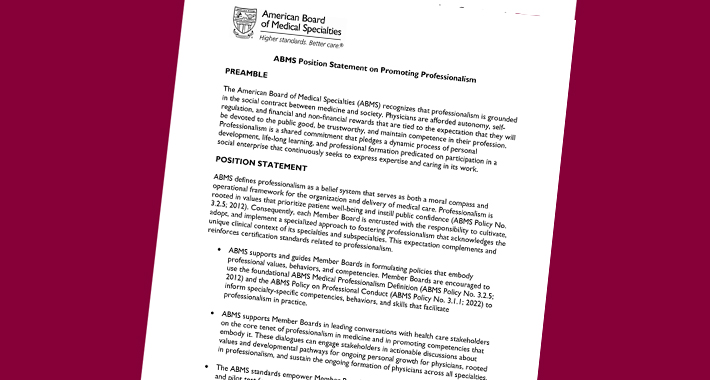
PREAMBLE
The American Board of Medical Specialties (ABMS) recognizes that professionalism is grounded in the social contract between medicine and society. Physicians are afforded autonomy, self-regulation, and financial and non-financial rewards that are tied to the expectation that they will be devoted to the public good, be trustworthy, and maintain competence in their profession.
Professionalism is a shared commitment that pledges a dynamic process of personal development, life-long learning, and professional formation predicated on participation in a social enterprise that continuously seeks to express expertise and caring in its work.
POSITION STATEMENT
ABMS defines professionalism as a belief system that serves as both a moral compass and operational framework for the organization and delivery of medical care. Professionalism is rooted in values that prioritize patient well-being and instill public confidence (ABMS Policy No. 3.2.5; 2012). Consequently, each Member Board is entrusted with the responsibility to cultivate, adopt, and implement a specialized approach to fostering professionalism that acknowledges the unique clinical context of its specialties and subspecialties. This expectation complements and reinforces certification standards related to professionalism.
- ABMS supports and guides Member Boards in formulating policies that embody professional values, behaviors, and competencies. Member Boards are encouraged to use the foundational ABMS Medical Professionalism Definition (ABMS Policy No. 3.2.5; 2012) and the ABMS Policy on Professional Conduct (ABMS Policy No. 3.1.1; 2022) to inform specialty-specific competencies, behaviors, and skills that facilitate professionalism in practice.
- ABMS supports Member Boards in leading conversations with health care stakeholders on the core tenet of professionalism in medicine and in promoting competencies that embody it. These dialogues can engage stakeholders in actionable discussions about values and developmental pathways for ongoing personal growth for physicians, rooted in professionalism, and sustain the ongoing formation of physicians across all specialties.
- The ABMS standards empower Member Boards individually and collectively to develop and pilot test formative self-assessment(s) as a means to promote professionalism. An ABMS Member Board may choose to pilot-test a formative professionalism self-assessment program(s) developed by another ABMS Member Board or identify and partner with an external organization. Assessments should be psychologically safe and aligned with meaningful interpersonal interactions (e.g., clinical settings), offering actionable feedback for learning, personal development, and improvement.
- ABMS stands by Member Boards in prioritizing learning and improvement in self- awareness, interpersonal, and social relationship skills, which form the bedrock of professionalism as a competency. ABMS Member Boards may identify training programs and resources that promote learning and improvement in professionalism competencies. Professionalism is contextual – influenced by the social environment in which physicians practice and are tailored to the needs of the people and social systems they serve.
- ABMS is committed to collaborating with the professional community to provide access to high quality tools and resources available to help physicians in promoting professionalism competencies.
RATIONALE
Certification by a Member Board represents a diplomate’s demonstration of the professionalism, knowledge, and skills that are essential for safe practice in a medical specialty. This certification holds a unique societal status, denoting expertise and trustworthiness, and is relied upon by the public and medical community. This acknowledged and respected status is in part due to the shared value of professionalism among Member Boards, a core element of ABMS board certification.
Professionalism encompasses a diplomate’s commitment to living out professional responsibilities, embodying medical virtues, applying technical skills in providing compassionate, patient-centered care, being attentive to diverse patient populations and workforces, and practicing wellness and self-care. Member Boards should actively promote professionalism throughout their continuing certification programs, aligning with patients’ needs and the specific practice contexts of their respective specialties.
While many Member Board policies primarily focus on issues of professional misconduct, there is an opportunity to foster dialog about the aspirational values that animate physicians and provide grounding to self-regulatory programs like certification. Between the minimally acceptable behaviors, skills, and competencies and the profession’s aspirational values lie competencies that can be developed and encouraged.
ABMS recommends a competency-based approach to professionalism that encompasses observable, teachable, assessable, and improvable skills and behaviors aligned with professionalism values. This builds on the Vision Commission’s recommendation that the ABMS implement assessments for professionalism and professional standing that include the consideration of multi-source feedback conducted on a regular basis to measure accountability for relational skills. Five areas of interpersonal behavior and social relationship skills that are highly valued in the health system today are interpersonal communication, shared decision- making with patients, teamwork, conflict management, and justice, equity, diversity, and inclusion.
Download this document: ABMS Position Statement on Promoting Professionalism[PDF]
-
Read More:
- Policies |
- Statements |
